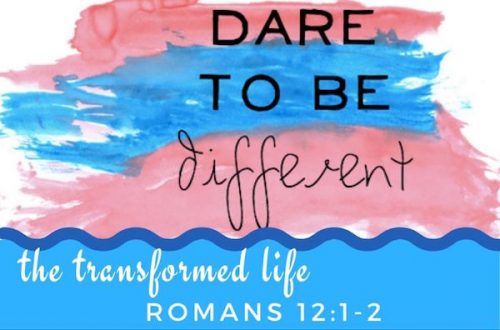TiVo for Life
TiVo changes things, doesn’t it?
TiVo changes things, doesn’t it?
My friend Rhea and I watched Top Chef episodes over breakfast this past weekend. I don’t have cable, so I’m not sure when it actually airs, but I relish the creative cuisine and competition inherent in the show. They can make a gourmet meal out of absolutely anything!
We watched, and then a particularly troublesome ad came on – you know the Prius one where the landscape is made out of gyrating people? Creepy! – and Rhea immediately pressed the fast forward button and boop! it was gone. Back to our show, already in progress.
Cut to the good part.
Fast-forward the unsavory, unnecessary, mundane.
Get to the resolution.
If only our lives had TiVo, right? Skip the waiting, the grief, the broken heart, the disappointment; get to the resolution.
John 11 paints a different picture; a meaning to the pauses – commercial breaks, if you will – in our lives.
If you’re not familiar with John 11, it’s a passage where Jesus hears that his dear friend Lazarus, brother to Mary and Martha, whom Jesus also loved, is terminally ill. Jesus’ response to the news is seemingly counter-intuitive.
I know it left me scratching my head. Here’s the passage of John 11:3-6:
So the sisters sent a message to Jesus, “Lord, look, the one you love is sick.”
When Jesus heard this, he said, “This sickness will not lead to death, but to God’s glory, so that the Son of God may be glorified through it.”
(Now Jesus loved Martha and her sister and Lazarus.)
So when he heard that Lazarus was sick, he remained in the place where he was for two more days. (emphasis is mine)
Whoa, whoa, whoa. When Jesus, the Healer, hears that Lazarus is sick, he stays put. He says the sickness doesn’t end in death, but God’s glory.
In the eyes of Mary and Martha, however, the pause between the time they send for Jesus and the time He actually arrives tells a different story. By the time Jesus comes, Lazarus has been dead in the grave for four days.
Have you ever prayed, pleaded, called out to and cried to the Lord, and felt like your prayers were greeted with silence?
Can you relate to Mary and Martha’s understandable confusion that their dear friend came too late? They both said "if you had been here, my brother would not have died."
I know I can fill in the blank: "if you had been here, my father would not have cancer." "If you had been here, I wouldn’t be laid-off." "If you had been here, he wouldn’t have left me."
What did Lazarus do to deserve this kind of neglect from the Savior? What had Mary and Martha done to be seemingly ignored by Jesus? Nothing.
Jesus’ response is troubling. That is, until we see the pattern of God’s use of pause for His glory. Here are a few examples:
In Genesis 2:18-20, before the Fall, Adam is naming animals and noticing that there are none that are quite like him. He lives with the tension of loneliness, before the Fall, even as God knew and thought to himself, "it is not good for man to be alone."
God used the pause between Adam’s discomfort and his introduction to Eve to alert Adam to his need so that by the time Eve came, he truly appreciated her.
In 1 Samuel 1, Hannah was surrounded by reasons to be depressed. She had a co-wife (which is pause enough for me!), Penninah, who was a baby factory, while Hannah remained childless. She had a husband, Elkanah, who didn’t get her. (You can see my previous post on why I appreciate Hannah’s response. She really understands the pause!)
Her priest didn’t even understand her. But the Lord had a plan to bring His prophet Samuel into the world, through Hannah. And perhaps because she understood supplication and spent so much time in the temple with her earnest prayer, Samuel was more inclined to hear the voice of Yahweh.
The people of Israel had 400 years of pause, between the last prophet, Malachi, and the coming of John the Baptist, the herald of Jesus Christ. 400 years of silence. Those silent generations must have looked back on their history and thought another pause; years of slavery their Israelite forbears spent, languishing, living and dying, until Moses came to emancipate them from Pharaoh’s rule.
But when Jesus came, he set captives free in soul as well as body. His was a pause worth waiting for.
Jesus experienced a pause. Sweating blood and water, He pleaded that the crucifixion would be a price He would not have to pay. But it was the only way. And for three silent days after Jesus was hung on a cross, killed, and buried, His body lay in a tomb. But there was more in store than the tomb, or all the power of hell, could hold. And Jesus was resurrected, Conqueror of Death. His death gave all who believe in Him life.
The time between Christ’s resurrection and His return is the Great Pause. We’re left here, in a world that’s rife with pain, disappointment, and hurt, waiting for Him to save the day. But I am thankful that this Great Pause persists, because there is more time for people to know Jesus and worship in spirit and truth. His pause is merciful.
The pauses are not necessarily God’s judgment, or His indifference. Could it be that His pause in your life is an act of mercy? A way to give you room to grow?
The hard question to ask during a time of silent pause and no "Life TiVo" in sight is: “Lord, how can this time glorify You? Can you give me eyes to see past this point to Your glory and will?” In John 11, the glory came! Jesus raised Lazarus, as a sign of His power and authority, and a metaphor for His impending death and resurrection. This circumstance clicked profoundly in Mary’s mind, and moved her to worship and prepare for Jesus’s death in John 12 (before Jesus’ own disciples understood what was to come, Mary got it. If it weren’t for the pause, Mary would not understand what Jesus’ mission was).
I challenge you not to try to fast-forward through the pauses, but to ask the Lord to guide you through them, and give you a divine perception of their meaning.



2 Comments
Bruce Casserly
Sharifa’s Blog
Great stuff ,Sharifa! This is my first visit to ANY Blog.
Bruce
Sharifa Stevens
Thank you, Bruce! :o)
Thank you, Bruce! :o)